Gaia & The Garden
What would it take to tell a better story about our relationship to life, love, and the planet?
Last spring around Earth Day I did a talk on biophilia. If you’ve never heard the term before, it’s pretty easy to figure out. Bio + philia = love of life, especially of the natural world. It’s thought to have been originally coined by Erich Fromm, a psychologist who defined it as “a passionate love of life and all that is alive.” The citation here is worth noting: that definition appears in his book, The Anatomy of Human Destructiveness.
That’s the whole problem right there, of course. We’re destructive beings. We’re loving, generative beings too, but we really lean into taking things apart. We’ve been destroying things for basically all of recorded history. Sometimes we just destroy each other; sometimes we destroy entire ecosystems. We’ve recently worked our way up to the entire planet, which we haven’t yet quite accomplished but are working very hard at. So although we say that we love life, and we mean it, there’s some darker part of us that seems to want to smash it to bits. We do this with a lot of things. We knock over blocks just to see them fall, because we want to confirm to ourselves that they fall. We smash things because it reminds us that we’re breakable.
That right there, basically, was the challenge in preparing my talk. I’ve never been entirely convinced of the claim that we just need to love life, earth, and nature more if we’re going to do better at not messing up the world around us. The story just never seemed to cohere. We actually do love life a lot — we obsess over having more of it — but we really can’t seem to help ourselves from kicking it around.
So I decided to go back to one of the earliest stories about life and the world to see if I might find a more revealing path into the theme, and then crafted a talk around that. Here’s how it went, roughly:
San Francisco | April 24, 2024
I want to talk about one of the best-known stories ever told. Probably the best-known; James Cameron might disagree.
In the book of Genesis, in the Bible, we are told that God gave us dominion over the Earth. More precisely, we are told that we are put on the earth to “tend it and keep it.” The way it goes is this: God creates everything, and then notices — having done the epic work of creating the universe and especially this particular planet — that he’s overlooked basic gardening, horticulture, and environmental management principles. He’s forgotten, for example, to create any means for watering the soil, so he makes rain. He also decides that for some reason this garden can’t take care of itself — a design flaw of his own making — and that it needs someone to do the gardening. So he makes us. Well, he makes Adam and Eve, who are both proxy and (if you believe this stuff) progenitors of us.
God makes Adam and Eve and he puts them in charge of the garden and gives them explicit instructions to tend it and keep it. To take care of it, and to put it to healthy use. He puts them there to be gardeners. Caretakers. Stewards. It seems like a pretty sweet arrangement, if you think about it. A magnificent plot of abundant land, all for them, and all they have to do is take care of it and not ask questions, and also follow just one super easy rule about not eating the fruit of just one particular tree.
We all know what happens, of course. Adam and Eve — or rather, we, because this is really a story about us — screw up the job and God kicks us out. We didn’t neglect the garden, exactly, but we certainly failed to obey its rules. We decided that we wanted knowledge more than we wanted paradise. And because we wanted knowledge more than we wanted paradise, we fell. We lost the best gift ever given to us.
Every eco story is, in a way, a Genesis story — a story about how we lose paradise. Every story about environmental crises and every story about post-collapse scarcity and every story about how we are destroying the earth is a story about our fall. In all of these stories, we fail in our stewardship of the garden, we fail to uphold our sacred pact, we trade the beauty and abundance of the garden for something that we are told we can’t have. We aren’t satisfied with the bounty that we’ve been given and so we insist upon something more and because of that we fail and we fall and then we need to find a way to survive our self-imposed exile from abundance and beauty. Every book or movie or show about human-created disasters is a kind of retelling of the story of our original biblical fall. And there are so many of these. We love these stories. They terrify us and thrill us and they do basically nothing to make us act any differently.
And this is such a curious thing: very few of the gajillion cinematic and literary iterations of our wildly influential bio-traitorous origin myth — the ultimate cautionary tale — have ever influenced us to do anything differently. Why is that?
Here’s why I think it is: I think that it’s because our failures — failing miserably at our sacred duty, messing up our job as stewards of the earth, getting cast out of the garden — don’t actually bother us. I’ll go a step further: we are fully comfortable with our failure. Perhaps it’s that we’re resigned to it, but I actually think that it’s more than that. I think that our failure is narratively interesting to us. It is, frankly, a good story. We are failed heroes, and failed heroism makes for really interesting storytelling. It opens up possibility for a redemption arc! And for sequels! We are in no hurry to redeem ourselves because that would foreshorten the story. We want all five Avatar movies, and a Marvel cinematic universe with a limitless stream of flawed heroes! A solid, conclusively redemptive ending — an ending where we restore the garden and live happily ever after — would rob us of that.
We love a failure story. We say that we love success stories, but do we really? We scoff at the idea of happy endings; we associate them with fairy tales and mark them as childish, as unrealistic. We like stories that make us bite our nails and worry about the characters. And yes, of course, we like to see our favorite characters make it through their trials and triumph in some way in the end, but still we wonder: what happens next? Will there be a sequel? Another season? In real life, we go on and face more trials; we go on and fail again. And so we look for that pattern in our stories.
Which points to a deeper reason why we are so attached to our failure story: it tracks to our expectations of ourselves. It reflects our experience of our own contradictions: we can want to succeed, but still architect our own failure. We can long for something, and still sabotage ourselves in seeking it. We can love a thing, and still hurt it. We worry about our propensity for failure and so we seek it out and try to understand it, even embrace it. To fail is human, and we struggle to understand and accept that. It is, I think, the knowledge that we want most to grasp—why can’t we be as gods and create perfect, fail-proof gardens? We eat this fruit and our tummies hurt, and then we eat more.
Back to biophilia. Does anyone doubt that we love life? That we love our Mother Earth? Even the most rapacious billionaires cherish and protect their (excessive) share of her, except perhaps the ones who want to flee to space, but even they dig deep into her skirts and make safe spaces for themselves within the folds. There’s no question that we love her. We love her in the same way that we love our human mothers. But here’s an uncomfortable truth: we are, collectively, very comfortable hurting mothers. We never hesitate to blame mothers. If Mother Earth were a human mother we would complain about her not taking better care of us. We would blame her for not doing more to protect us. We would tell her that she was too harsh with us, too strict, that she punished us too much, that she restricted our freedom, that she didn’t put us first. We would tell her she traumatized us. We would tell our therapists, she didn't love us enough. Our therapists would tell us that it’s okay to go no-contact with her, that we have to put ourselves first for once.
I’ve often wondered if it would be different if we identified the Earth as Father. Would we respect and fear Father Earth in ways that we don’t our Mother? Would respect and fear earn better behavior from us? Would we be more inclined to obedience? And when we did disobey (we always disobey) would we say that we deserve his anger, his punishment? We brought it on ourselves, we might say. We were rowdy kids. We might still go to therapy, but we wouldn’t tell Dad what the therapist said.1
We pay attention to the things that we fear. We often take for granted the things that we love.
I am painting us with a wide, sloppy brush right now, but I don’t think that I am coloring too far outside the lines. Sometimes we stand up to the things that we fear, sure. And often we take good care of the things that we love. What I’m saying is, it’s not enough for us flawed, fail-happy beings to simply say to ourselves that we just need to love life more if we’re going to preserve it, or love the Earth more if we’re going to save her. We have always loved these things abundantly. But love is not a simple story. When Virgil said that love conquers all (omnia vincit amor), he didn’t mean that love overcomes everything, all obstacles, he meant that love overcomes everyone. Love isn’t always soft and fluffy, floating in on dove-like wings: love is also a spinning, many-eyed, terrifying beast-wheel of an angel2 that knocks us on our asses and leaves us quaking. We do weird shit because of love, because love is longing; because love is messy and unpredictable and complicated and crazy-making and also the thing that we want most in this world; the real reason, maybe, that we always eat the fruit.
And it’s not just love that we need to rethink: we also need to reconsider this idea that we need to save Mother Earth, because for one, she doesn’t need saving (she’s going to be here long after we’re gone) and two, that savior story is not serving us, at least not in the work of our own survival. We’ve been working that story for millennia and look at where it’s gotten us. We need to liberate ourselves from hero’s journeys in which we cast ourselves (or more ordinarily, just a few special ones among us) as the heroes, where Earth is the thing to be saved, where there’s a redemption arc that takes three trilogies to work itself through and then still leaves room for multiple spin-off series. We don’t need to junk these stories entirely, but we do need to imagine some alternatives. We need to get curious about what else is out there for us, on the vast landscape of human possibility.
We could offer this prompt for a story: what happens after the garden? The Bible version is not super interesting; it’s a lot of “so-so beget so-so; so-and-so beget so-and-so” and so on like an interminable Ancestry dot com marketing email. What if we rewrote another story entirely, based around questions like: what do we make? What do we create? How do we use our brave curiosity to imagine something better than the garden? Remember that the garden is just one piece of a vaster world — what are the stories in which we generatively embrace the vaster world and explore all the horizons of possibility?
We need, in other words, to keep eating the fruit. We need to stop berating ourselves for our fall, for our failure, and ask ourselves: what better knowledge -- what stories — can we create to make a better world beyond the garden, one that does not claim ownership of the garden but rather expands its possibility? What if we took “be fruitful and multiply” and re-authored it to mean: be fruitful and multiply the bounty of your imagination? In which case, eating the fruit is a necessity, because it allows and encourages us to see beyond the walls of what was supposedly created for us and see everything through the lens of greater possibility. The earth not as our mother, or our father, but perhaps as a home in which we are just guests. God not as a divine male architect and builder and ruler, but as a kind of sky, an open space of energy and light. The fruit of the tree of knowledge as just a neat piece of lore in a cool story. Everything as story, always as story—as a blank page or empty space into which can we pour all the magic of our imaginations, and then explore freely, enchanted, wondering at what parts of this extraordinary world we’ve made up and what parts were always there outside of us to discover.
We don’t need to catalyze biophilia. We need to catalyze the bio-imaginary. Solarpunk. Hopepunk. Lovepunk. Movies and shows and books and poems and songs and games and experiences that inspire us about what’s possible.
We need to stop telling ourselves that we need to love “her” more, our so-called Mother Earth, so that we might be more motivated to save her. We’re not good at saving, and in any case, she is not here to be saved. She is vaster than us, and the most interesting stories that could be told about her would seize that opportunity. She / them / it / us IS the opportunity.
She is not a character: she is the whole plot. She is context, she is background, she is canon, she is landscape, she is camera, she is pen, she is voice. She is thriller, she is horror, she is sci-fi, she is comedy, she is romance, she is mumblecore, she is documentary, she is fairy tale. She is God, whatever that means.
We need to stop trying to narrate our way into convincing ourselves to love her enough to save her. We love her already, and that hasn’t been enough. Because saving isn’t the real path. Imagining is.
*Gratitude to the magnificent redwood forests of Mendocino County, California, for appearing in this story. And to the magical for the topmost picture of my unkempt feet and the beautiful fallen tree. Thanks too to
for inviting me to be an Earth Day provocateur.cf. our relationship to God
This is the angel that everyone claims to have seen on psychedelics, the terrifying cherubim described in Ezekiel. Be careful with drugs, kids.



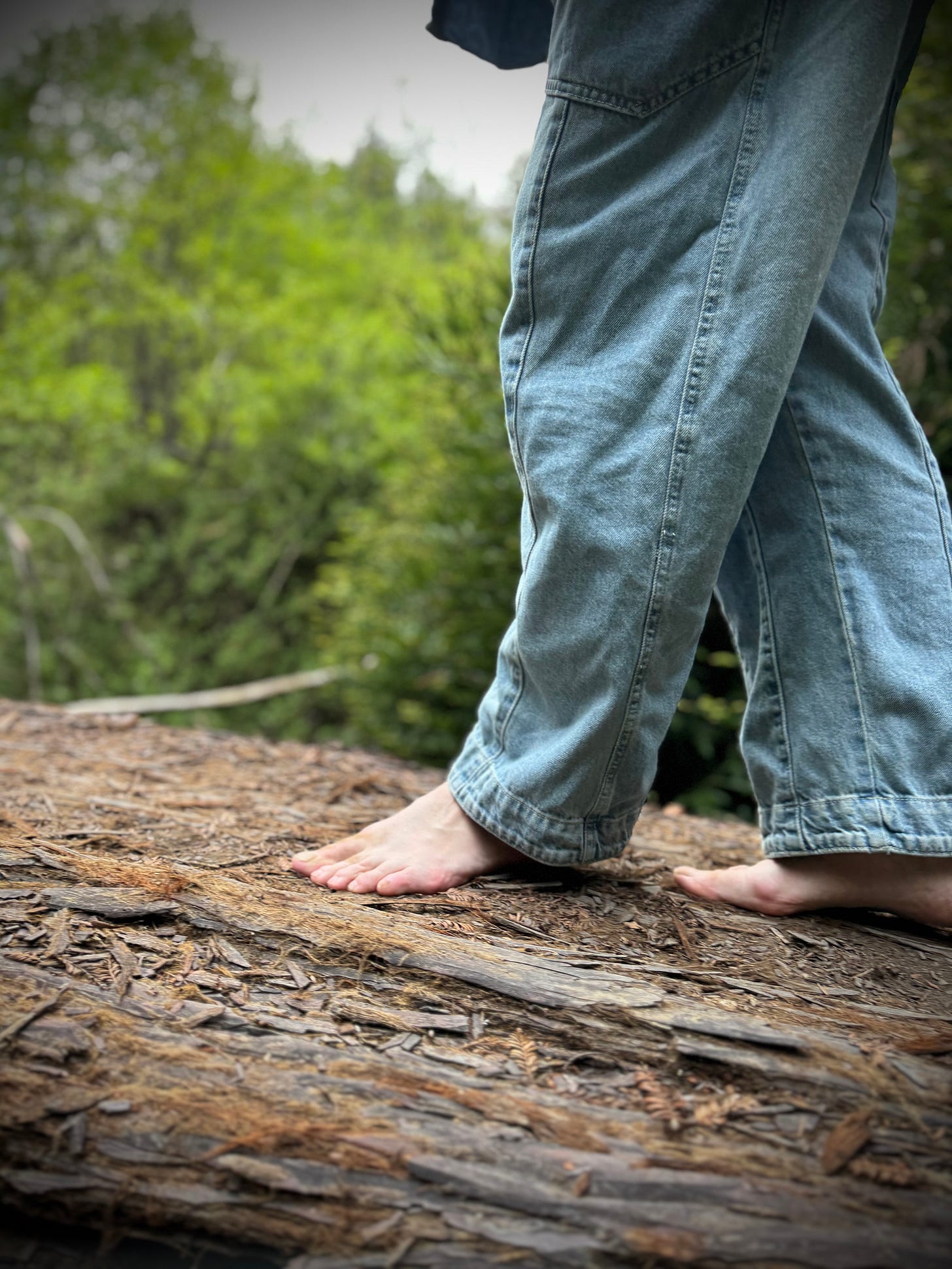
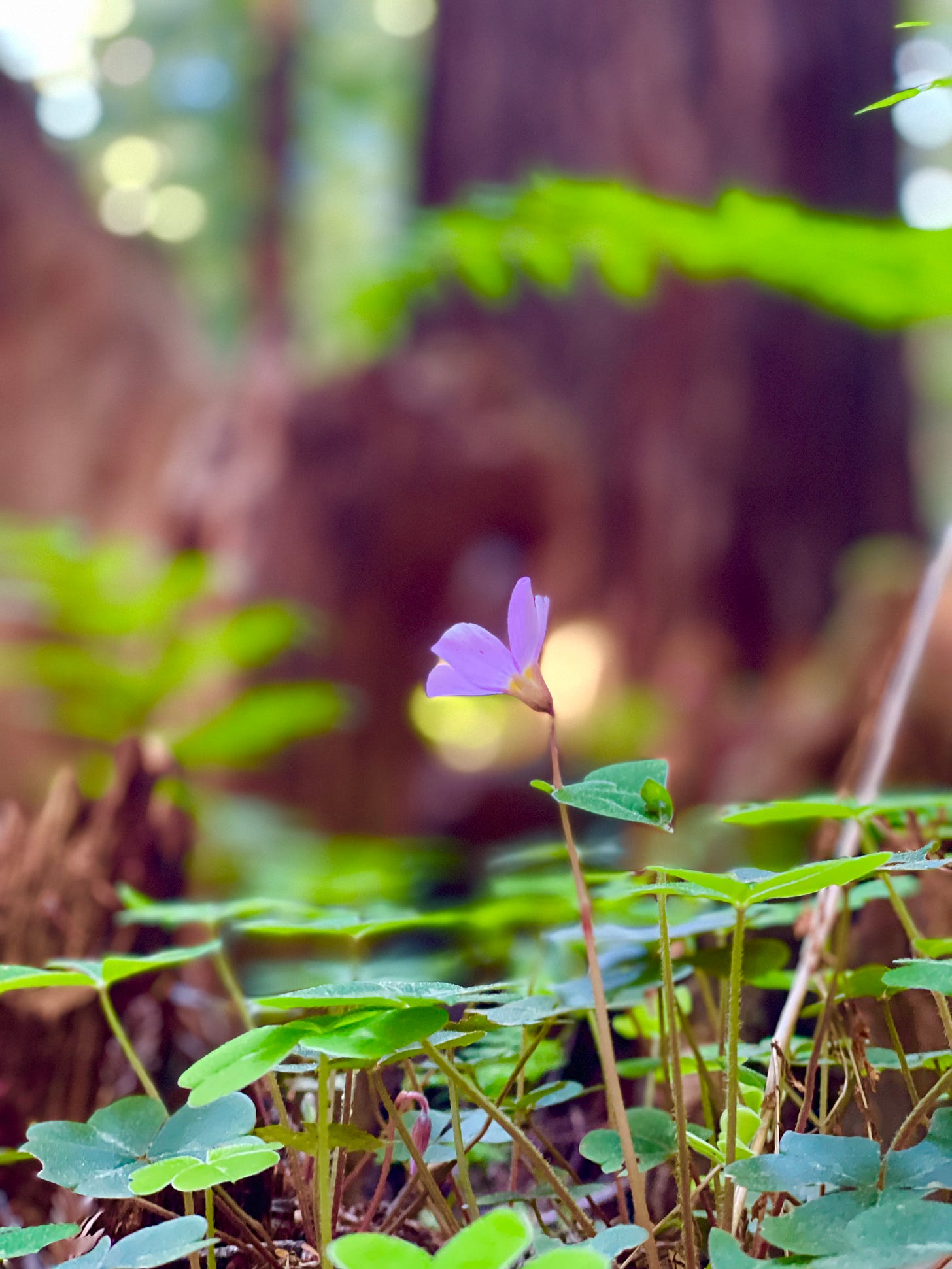
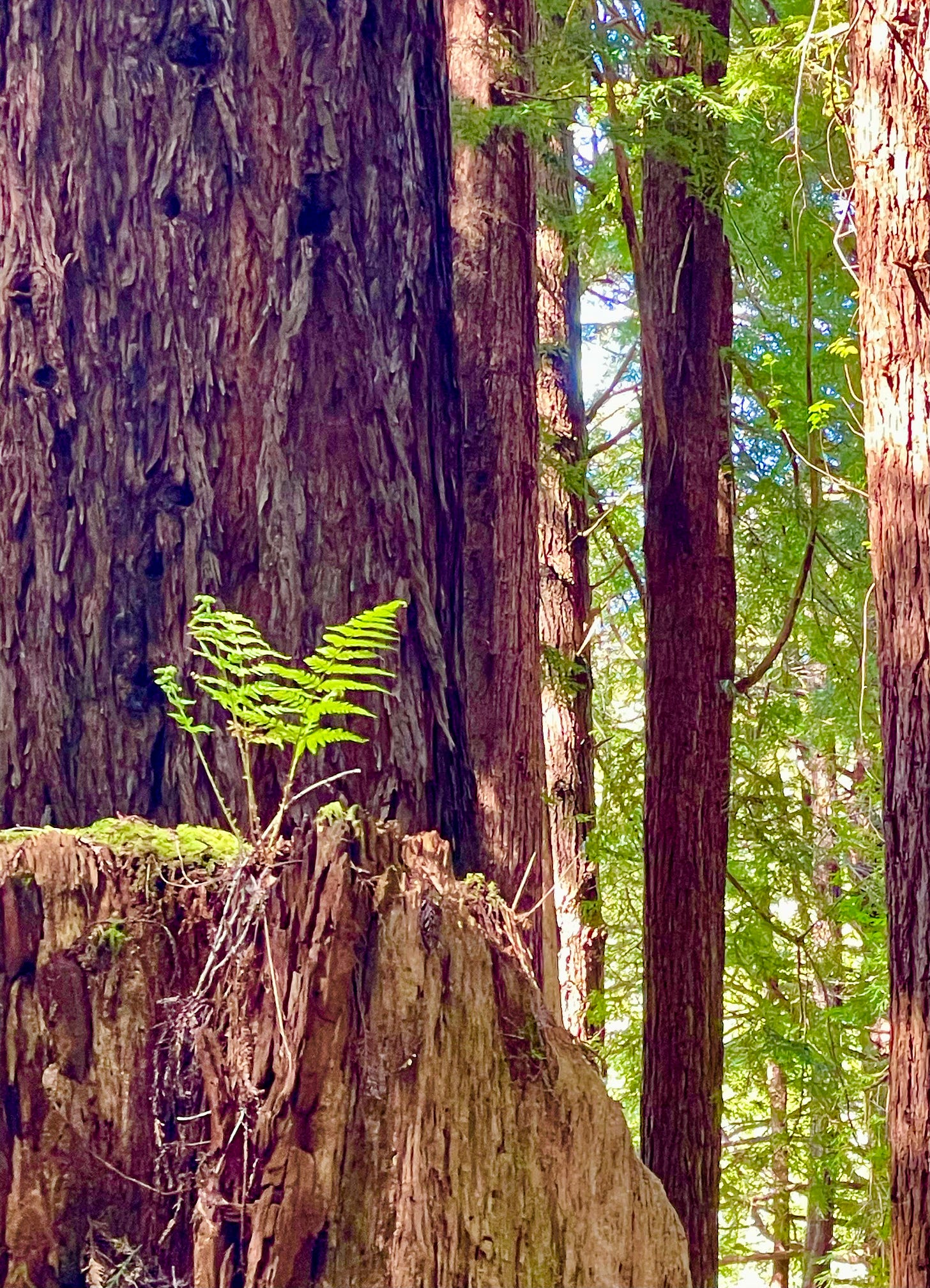
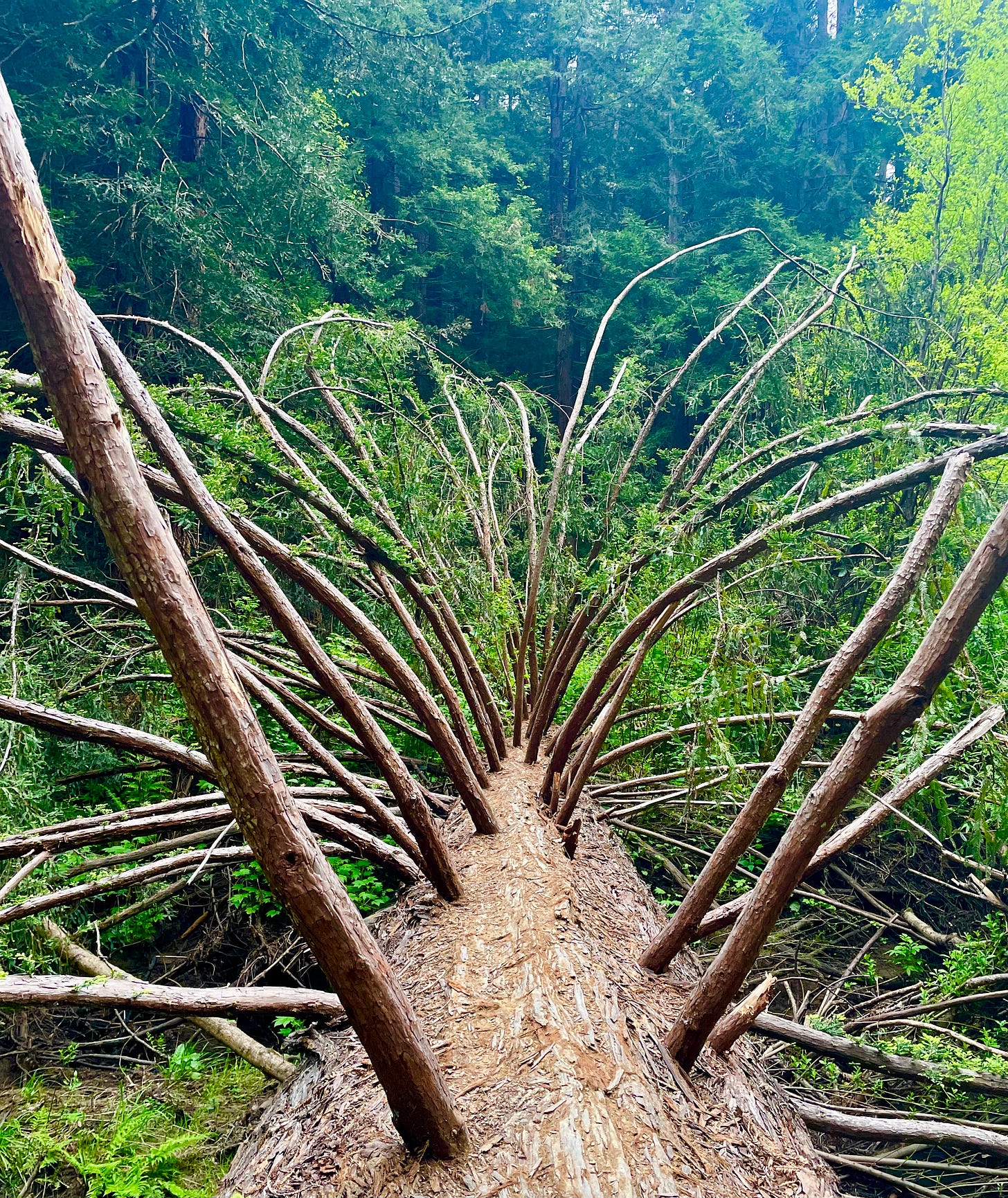
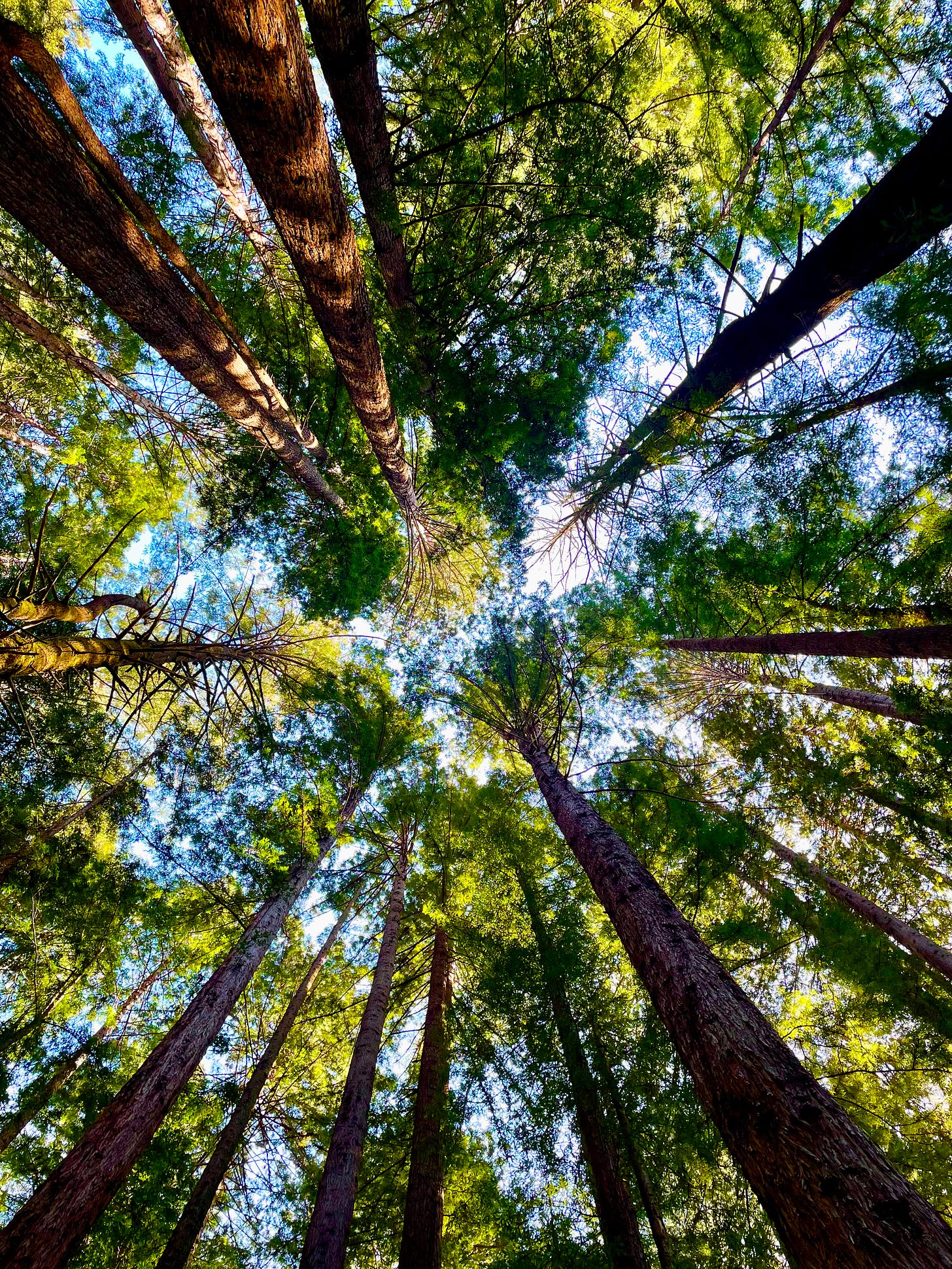
Once a very long time ago I tripped,LSD and saw the end of the world. There were gigantic machines whose sole purpose was to chew thru all the debris and waste .It was pollution that ends mankinds rule, not bombs, or nature. This vision is as clear now as it was 55 years ago. Just thought I'd share
There is a community where I have a small house called Serenbe. It is a biophilic community… and mostly built using sacred geometry. It is well worth looking at. It has become expensive the last few years but you can feel and see how lovely and simple the first homes were.